This is a series of publications developed with funding from Employment and Social Development Canada. The multimedia resource package is focused on increasing the knowledge and awareness of how intermediaries can use the law to prevent and reduce elder abuse. (Resources are available in English and French)
Any deliberate action or lack of action that causes harm to an older adult. The harm could be physical, emotional, financial or some combination and is often caused by a close friend or relative.
Alberta Resources
This handbook from Alberta Civil Liberties Research Centre provides information on a range of legal subjects of interest to seniors (people who are 65 years of age and older). It is written in “plain English” and is intended as a basic resource for seniors, their friends, relatives and advocates. In a question-answer format, the handbook provides an overview of issues facing seniors, including abuse, mental health, guardianship and trusteeship, personal directives, powers of attorney and consumer protection. Includes a glossary and list of senior-serving agencies in Alberta. (PDF - 150 pages, 2010)
This online tutorial created by the Centre for Public Legal Education Alberta provides information about the structure of a trial after making a criminal complaint.
The Support Network is located in Edmonton, Alberta, and provides community information services, crisis intervention, and suicide prevention. Its help lines are free, anonymous, confidential, and available every hour, every day. Help is also available in person and online. 24-Hour Distress Line: 780-482-HELP(4357)
Canada/Federal
Published by Canadian Centre for Elder Law, this comprehensive resource includes snapshots of the law in each of the thirteen provinces and territories, a comparative table that allows for quick reference, a set of guiding principles for working with vulnerable adults, and sections that discuss mandatory report ing of abuse and neglect, rules around confidentiality of personal and health information, and the relationship between mental capacity and elder abuse. The guide also contains a lengthy list of resource agencies. This PDF (71 pages, 2010) is available for free download.
Created by the BC Law Institute, the Canadian Centre for Elder Law is a national, non-profit body dedicated to exploring the particular legal issues which affect older Canadians through research, law reform, and education. CCEL has published plain language materials on these topics targeting health care practitionners, non-profit organizations, and the general public.
The CNPEA is a national non-profit organization focused on elder abuse prevention and response. They connect people and organizations; foster the exchange of reliable information; and advance program and policy development on issues related to preventing abuse of older adults.
A series of publications from the Department of Justice Canada about family violence, including stalking and criminal harassment. Several are available in multiple languages.
This website has information about elder abuse, with brochures and videos on these topics: What You Can Do When Abuse or Neglect Is Happening to an Older Adult in Your Life, How You Can Identify Abuse and Help Older Adults at Risk, and What You Can Do to Keep Yourself Safe from Abuse








Follow CPLEA